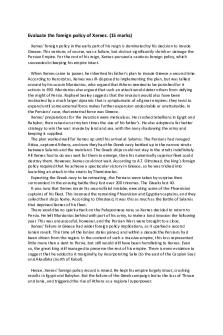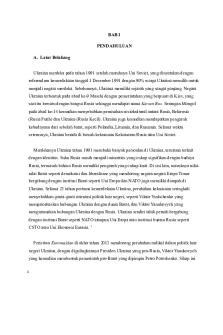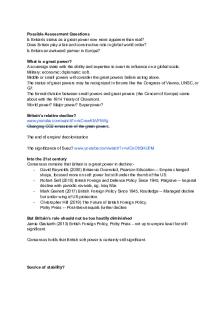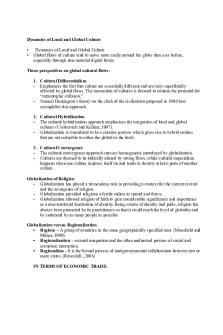Pakistan’s Foreign Policy in Changing Regional and Global Dynamics DOCX

| Title | Pakistan’s Foreign Policy in Changing Regional and Global Dynamics |
|---|---|
| Pages | 14 |
| File Size | 58.6 KB |
| File Type | DOCX |
| Total Downloads | 756 |
| Total Views | 849 |
Summary
Pakistan’s Foreign Policy in Changing Regional and Global Dynamics By Dr. Huma Baqai Introduction: Realism remains the foundation school of thought for any foreign policy analyst. Realists are the traditionalists in International Relations and Security Studies.1 Thus, the core assumption of groupism...
Description
Pakistan's Foreign Policy in Changing Regional and Global Dynamics By Dr. Huma Baqai Introduction: Realism remains the foundation school of thought for any foreign policy analyst. Realists are the traditionalists in International Relations and Security Studies.1 Thus, the core assumption of groupism, egoism and power-centrism continue to be used to justify foreign policy behavior,2 which is built around national interest. The concept of the national interest in foreign policy making became the core focus to the development of Realism in post- Second World War years and continues to dominate both the academia and governments. Morganthau brought the concept to prominence, stating that the fundamental aim of foreign policy must be to ensure: the integrity of the nation's territory, of its political institutions and of its culture. Thus the core objective of foreign policy remains national security. However, "National Security as an Ambiguous Symbol", authored by Arnold Wolfers, some over fifty years ago, suggested foreign policy is dictated by the national interest, more specifically by the national security interests.3 Lippmann gave a functional understanding of it as; "A nation has security when it does not have to sacrifice its legitimate interests to avoid war and is able, if challenged to maintain them by war".4 National security centrist approach from the realist school is rooted in the Thomas Hobbes' view of state interactions, synonymous to a state of war of all against all; thus the core objective of foreign policy is to ensure survival of the state. For the realist the basic national interest of all states is national security, where politics is for survival and not progress. Progress is important, but is not of prime importance. Applying the theories to the contemporary inter-state relations of South Asia, it is evident that all states play power politics. According to Morganthau, the lust for power results in three types of foreign policy, behaviors or thrust. 1 Peter Hough, Understanding Global Security (New York: Routledge, 2004), 2. 2 Steve Smith, Amelia Hadfeld, Tim Dunne (ed.) Foreign policy: theories, actors, cases (New York: Oxford University Press, 2008), pp. 36-37 3 Arnold Wolfers, "Natonal security_ as an Ambiguous Symbol" Politcal Science uuarterly (New York) Vol. 67, No. 4. (Dec., 1952): 481-502. 4Peter Hough, Understanding Global Security (New York, Routledge, 2004), 10....
Similar Free PDFs

Foreign Policy in Latin America
- 11 Pages

Xerxes\' foreign policy - answer
- 1 Pages

Foreign Policy notes
- 4 Pages

Synopsis Indian Foreign Policy
- 21 Pages

02. Qatar’s foreign policy
- 15 Pages

Global competitive dynamics
- 2 Pages

Regional star to global leader
- 5 Pages

Pakistan Foreign Policy 1947 to 2004
- 30 Pages
Popular Institutions
- Tinajero National High School - Annex
- Politeknik Caltex Riau
- Yokohama City University
- SGT University
- University of Al-Qadisiyah
- Divine Word College of Vigan
- Techniek College Rotterdam
- Universidade de Santiago
- Universiti Teknologi MARA Cawangan Johor Kampus Pasir Gudang
- Poltekkes Kemenkes Yogyakarta
- Baguio City National High School
- Colegio san marcos
- preparatoria uno
- Centro de Bachillerato Tecnológico Industrial y de Servicios No. 107
- Dalian Maritime University
- Quang Trung Secondary School
- Colegio Tecnológico en Informática
- Corporación Regional de Educación Superior
- Grupo CEDVA
- Dar Al Uloom University
- Centro de Estudios Preuniversitarios de la Universidad Nacional de Ingeniería
- 上智大学
- Aakash International School, Nuna Majara
- San Felipe Neri Catholic School
- Kang Chiao International School - New Taipei City
- Misamis Occidental National High School
- Institución Educativa Escuela Normal Juan Ladrilleros
- Kolehiyo ng Pantukan
- Batanes State College
- Instituto Continental
- Sekolah Menengah Kejuruan Kesehatan Kaltara (Tarakan)
- Colegio de La Inmaculada Concepcion - Cebu







